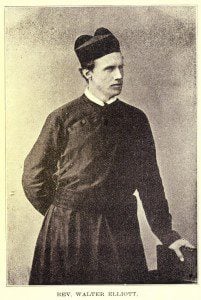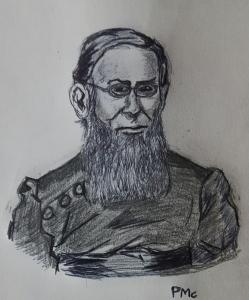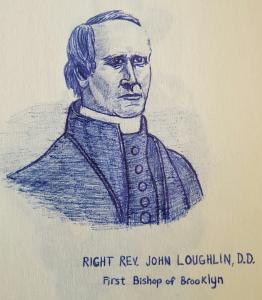
ASCENSION DAY. “And while they gazed on Him going into heaven.” From this Day’s Epistle.
SURELY, my brethren, our Lord Jesus Christ took to heaven with Him His Apostles hearts and souls. And this formed part of His joy. Next to the joy of being with them, was that of consciousness that their souls lovingly followed Him to His throne of everlasting bliss. He knew that scarcely anything but His glory could now engage their minds. Should it not be so with us? Shall not Jesus glorified be pleased if we can truthfully say with St. Paul: “Our conversation is in heaven?” (Phil. iii. 20.) The Apostle means by the word “conversation” our thoughts, resolutions, and longings, as well as our daily speech. Brethren, we talk of everything except heaven, the sweetest of all topics of conversation, for heaven is the final and perpetual union of our souls with God in the very perfection of all joy. And this blissful union with God shall include close association with Mary, the Mother of God, and all the saints and angels; also the delightful companionship of our beloved friends and relatives. This subject occupied much of our Savior s thoughts and speech while on earth. He began His great sermon on the Mount by telling of the heavenly reward of voluntary endurance of poverty: “Blessed are the poor in spirit, for theirs is the kingdom of heaven” (Matt. v. 3). And even when He threatened the wicked with eternal punishment in hell, He always promised the penitent the rewards of heaven. After His Resurrection, His principal topic with His disciples was how to win heaven ” appearing to them and speaking to them of the kingdom of God” (Acts i. 3).
How delightful a thought is that of Paradise. When such things occupy our minds, the years fly by quickly enough. St. Teresa used to say : ” It comforts me to hear the clock strike, for then I feel that I have drawn a little nearer to seeing God, since one hour more of my life is passed.” Brethren, it is well to bear in mind how very personal is the promise of our Savior to give us everlasting happiness. For it is certain that Jesus died not only for all men in general, but for each one of us in particular. The whole wealth of His merits is mine; it is as if I alone occupied every thought of His sorrowful soul on Calvary. So that in heaven He is not only the joy of all the blessed in a general and common happiness, but He is all in all to each one in particular, is to be all His own divine self to you and me, taken apart from all others. He shall be mine as if He and all His Paradise were for me alone. Think of your joy when Jesus will speak to you as a man is wont to speak to his friend; nay, think of the Son of God living affectionately with you; think of your enjoying His company in daily intercourse. Thus does Jesus describe it:
To him that shall overcome, I will give to sit with Me in My throne; as also I have overcome and am set down with My Father in His throne ” (Apoc. iii. 21).
What ails us, then, that we think so little and say so little about God’s happy home in eternity? Why do we talk more about hell than heaven? Why do we serve God rather to escape everlasting torments than to enjoy everlasting happiness? Why is it that this poor perishing earth absorbs our affections rather than the glories of Paradise? Brethren, may God grant you all a deep longing for heaven, and a hearty love for the only means of going there, namely, keeping His commandments and receiving the sacraments of His Church. It behooves us often to meditate attentively on those ages of celestial bliss.
Brethren, the greatest deprivation of this life is that we cannot see God clearly, nor rightly feel His love. Hence the Apostle calls his existence here this body of death, and cries out to be delivered from it (Rom. vi. 24). Death, the sharpest of pains, if it be a good death, is the most precious boon we can receive, for it enables our soul to see God. Quickly or slowly cleansed in purgatory, the soul at last darts into the bosom of its loving Father, and instantly knows Him and loves Him divinely, having every love that can increase its joy. But that is not all. The soul knows and feels itself loved with God’s own love, which is of so great an excellence that it is one of the Three Divine Persons of the Blessed Trinity, the Holy Ghost. Even now all true love of ours partakes of that divine Spirit. What was the most perfect love mortal ever had? Surely it was the love that Mary felt for her Divine Son, and the Angel Gabriel described the receiving of that love thus : “The Holy Ghost shall come upon thee” (Luke i. 35). Of course, no other created being shares that prerogative of Mary. But, nevertheless, for our own share we have the same Holy Spirit imparted to us, for in every sacrament from Baptism to the Last Anointing, God s Church says to us in effect: The Holy Ghost hath come upon thee. This gift of the Holy Spirit is furthermore renewed over and over again. The Third Divine Person is granted us at every prayer and almsdeed, and kind word, and charitable thought, and act of meekness or of patience. Yet here on earth all the divine reality of this is known, but in the obscurity of faith. We must constrain ourselves by our higher spiritual faculties to realize that a Christian life is a divine one. It is known as the indistinct forms of his loved ones are dimly seen by a man almost blind, or like the murmured tones of beloved voices in the ears of one but half awake. But in heaven the Father and the Son and the Holy Spirit shall be upon us and in us in so perfect a manner as to give us God as God is, to be seen and known and loved as God only can be by means of His unstinted bestowal of Himself.
Let us hasten, then, to perfect ourselves for this glorious destiny. Our Redeemer is named in Scripture the Author and Finisher of our faith (Heb. xii. 2). The finishing touch of this divine Artist is seen in what has been called the second conversion, meaning the perfect conversion. This presupposes a soul long since resolved upon a holy life and already registering progress, but yet holding back from entire devotedness. In the second conversion a powerful supplementary grace is felt, by which a matured and final adjustment of all means of virtue to the one great end of life is effectuated. Speaking of this, Pere Lallemant says that most of those who arrive at perfection undergo two conversions : “One by which they give themselves to the service of God; the other by which they devote themselves entirely to perfection.”
My brethren, such a thought should be an inspiration to more and more energetic practice of virtue, keeping always in view the rewards of eternal life. Perhaps the clearest description of this mentality is that of St. Paul: “Not as though I had already attained, or were already perfect; but I follow after, if I may by any means apprehend, wherein I am also apprehended by Christ Jesus. Brethren, I do not count myself to have apprehended. But one thing I do: forgetting the things that are behind, and stretching forth myself to those that are before, I press toward the mark, to the prize of the supernal vocation of God in Christ Jesus” (Phil., iii. 12-14). Despondency is in many cases the enemy. Let us remember that in all orders of life the best success is often gained after failures. To know how to succeed one must (oftentimes at least) learn how to bear the chagrin of defeat. In religious matters failure takes self-trust out of us. When a person at last feels compelled to fall back on God’s pure bounty or perish ever lastingly, he is not far from being saved. God is never a success with me till I am a total failure with myself, and am willing to own it. Only after the dark hours of a long night of disaster do we “launch out into the deep ” (Luke v. 4) of God s love, wholly dependent on Him, nay, cheerfully reliant on His goodness. Towards this frame of mind the lessons of our Redeemer s Ascension into heaven are exceedingly helpful.
Walter Elliott, C.S.P., Parish Sermons on Moral and Spiritual Subjects for All Sundays and Feasts of Obligation (New York: Paulist Press, 19123), 216-220.











